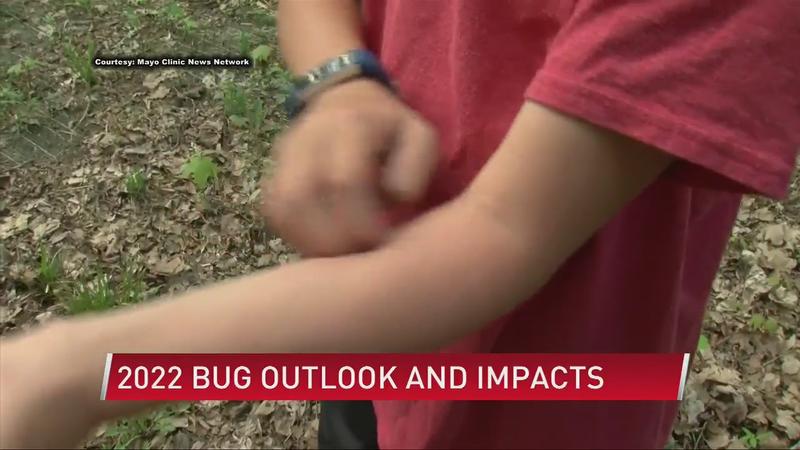Bug outlook for southern Minnesota and northern Iowa
[anvplayer video=”5114026″ station=”998128″]
(ABC 6 News) – We are about 2 inches above average for rainfall at Rochester International Airport so far in 2022. This along with incoming warmth will allow bug populations to thrive this summer.
According to the National Pest Management Association, the wetter conditions we have seen this year will support higher mosquito and tick populations than last year. The climate prediction center is also adding that slightly above average temperatures are expected at the beginning of summer. This will support populations of stinging bugs.
Pets are more prone to ticks than humans. Dr. Matthew Aliota, a professor at the University of Minnesota at the College of Veterinary Medicine, explains why. "They’re lower to the ground. They come into contact with low, hanging brush more frequently than humans. I’ve already picked ticks off of my dog a few times this month already."
Humans are not immune from ticks, however. They are certainly not immune from mosquitos either. Dr. Aliota adds where they can be found and why. "Whatever host their on, whether it’s a dog or a human, they have a tendency to move to discrete areas where they can’t be groomed off."
On pets, this tends to be in the stomach or abdomen area. On humans, areas include behind the ears, underneath armpits, behind legs, or even between toes to name a few.
Despite a colder spring than normal, the above-average rainfall has allowed for mosquito population to grow in recent weeks. Dr. Aliota explains part of the lifecycle of a mosquito. "Mosquitos have an aquatic stage to their lifecycle. So they lay eggs and the eggs hatch. They require a period of time to develop in water."
According to the CDC, mosquitos develop in still, stagnant water. The extra rainfall we have been seeing in 2022 is assisting their development, although the development of the mosquito ranges from a few days to a few weeks depending on temperatures outdoors, with hotter weather speeding up the process. The colder spring we have been having could keep us from having an exponential number of mosquitos this year despite the additional rainfall.
According to the National Pest Management Association, wetter conditions could drive more ants indoors as if they did not want our dinner enough already.
